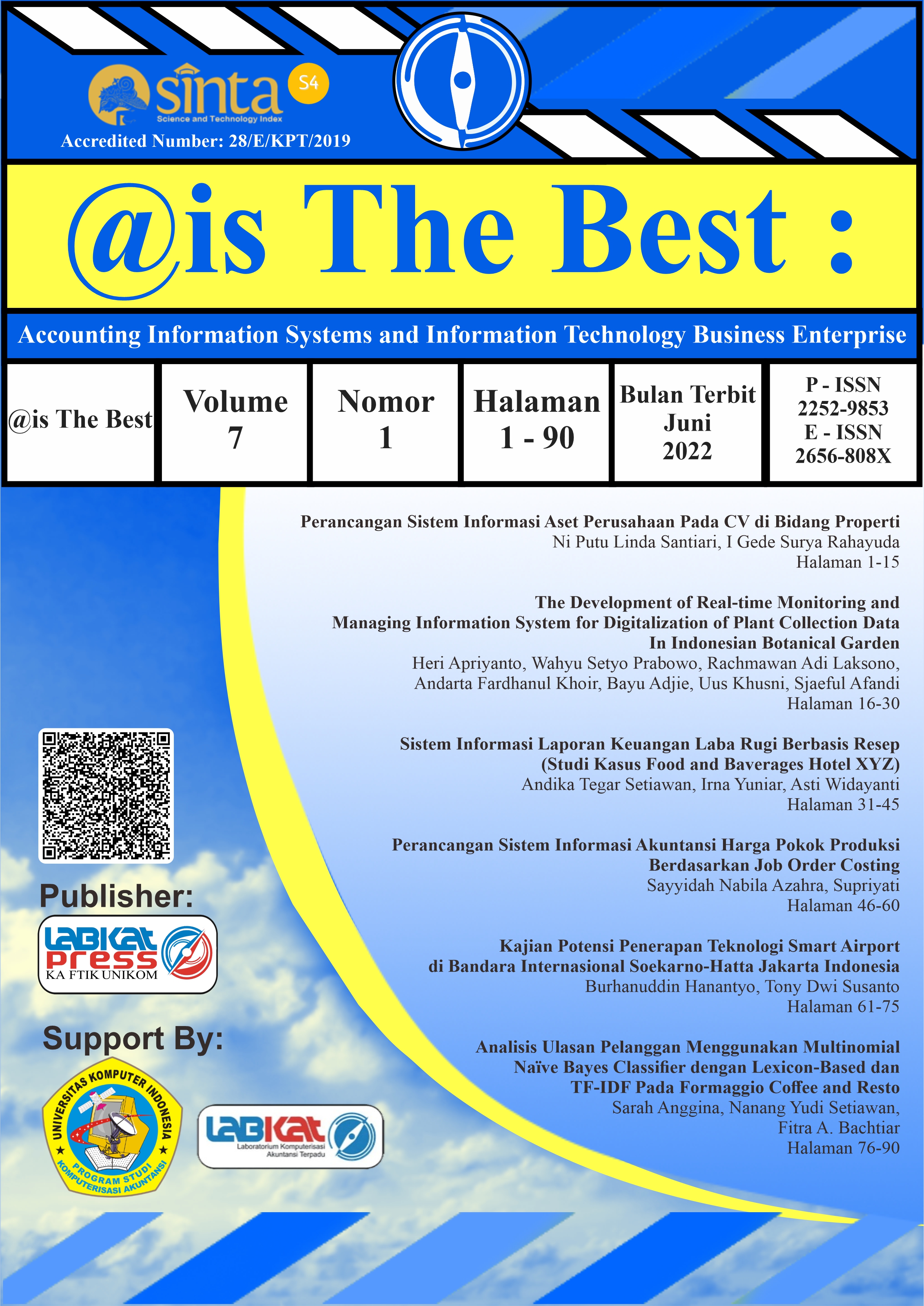Analysis of Customer Reviews Using Multinomial Naïve Bayes Classifier with Lexicon-Based and TF-IDF at Formaggio Coffee and Resto
Main Article Content
Abstract
Formaggio Coffee and Resto Tangerang serves western dishes with flavors that are tailored to the tastes of the Indonesian people. The increasing number of restaurants in Tangerang every year makes Formaggio Coffee and Resto supposed to have a competitive advantage by increasing customer satisfaction. Customer satisfaction can be obtained if customer expectations are met. Formaggio management considers criticism and suggestions given by customers as a positive thing that can improve their performance. However, the large number of customer reviews scattered across various sites makes it difficult for the restaurant to manage their customer opinions. This can be overcome by web scraping on the review sites, such as Traveloka, PergiKuliner, Zomato, and Google Reviews. The data that has been collected is 741 reviews with a time span from 2018 to 2021. Then, to get the information from customer reviews, sentiment analysis can be implemented using the Indonesian Sentiment Lexicon dictionary, TF-IDF features, and Multinomial Naïve Bayes Classifier. The classification model was tested using confusion matrix with four parameters, such as accuracy, recall, precision, and f1-score. The average value of each parameter is 95%, 68%, 85%, and 72%. The results of the research were visualized into a dashboard and tested using the System Usability Scale (SUS) questionnaire with 67.5 as a final score, which means the dashboard is well received by Formaggio management.
Downloads
Article Details
Section

This Journal is licensed under a Creative Commons Attribution-ShareAlike 4.0 International License
How to Cite
References
T. Tariq, “Identifikasi Faktor-Faktor Yang Mempengaruhi Minat Berkunjung Ke Oliver Cafe, Jakarta,” Jurnal Interaksi : Jurnal Ilmu Komunikasi, vol. 4, no. 1, pp. 41–49, 2020, doi: 10.30596/interaksi.v4i1.3735.
B. P. S. K. Tangerang, “Jumlah rumah makan / restauran menurut kecamatan di kota bekasi,” no. 1. p. 2507, 2020.
F. Buttle, Customer Relation Management,Concept and Technologies, Second Edition, no. 1. 2008.
Supriyati, A. S. Gumilar, S. D. A. Hendarsyah, S. C. Ulfah, and C. N. Albar, “Sistem Informasi Konsultasi Desain dan Dekorasi Taman Berbasis Website,” IJIS – Indonesian Journal On Information System, vol. 6, no. 2, 2021.
Supriyati, R. S. Bahri, and E. Komarudin, “Computerized of International Financial Report Standard for Good Governance in Small Medium Enterpreses,” in IOP Conference Series: Materials Science and Engineering, 2019, vol. 662, no. 5, doi: 10.1088/1757-899X/662/5/052009.
S. Supriyati and D. Rizky, “Model Perancangan Sistem Informasi Akuntansi Budidaya Perikanan Berbasis SAK EMKM dan Android,” @is The Best : Accounting Information Systems and Information Technology Business Enterprise, vol. 3, no. 2, pp. 301–315, 2018, doi: 10.34010/aisthebest.v3i2.1526.
D. Ekawati and M. L. Khodra, “Aspect-based sentiment analysis for Indonesian restaurant reviews,” Proceedings - 2017 International Conference on Advanced Informatics: Concepts, Theory and Applications, ICAICTA 2017, pp. 4–9, 2017, doi: 10.1109/ICAICTA.2017.8090963.
O. Sharif, M. M. Hoque, and E. Hossain, “Sentiment Analysis of Bengali Texts on Online Restaurant Reviews Using Multinomial Naïve Bayes,” 1st International Conference on Advances in Science, Engineering and Robotics Technology 2019, ICASERT 2019, vol. 2019, no. Icasert, pp. 1–6, 2019, doi: 10.1109/ICASERT.2019.8934655.
M. Lailiyah, S. Sumpeno, and I. K. E. Purnama, “Sentiment Analysis of Public Complaints Using Lexical Resources Between Indonesian Sentiment Lexicon and Sentiwordnet,” pp. 307–312, 2017.
W. P. Ali, Y. Sibaroni, and S. Si, “Analisis Sentimen Masyarakat Terhadap Kinerja Presiden Indonesia Dalam Aspek Ekonomi , Kesehatan , dan Pembangunan Berdasarkan Opini dari Twitter,” e-Proceeding of Engineering, vol. 6, no. 2, pp. 8637–8649, 2019.
C. B. Dewa, “Pengaruh Kualitas Restoran Terhadap Kepuasan Pelanggan Cengkir Heritage Resto And Coffe,” Khasanah Ilmu - Jurnal Pariwisata Dan Budaya, vol. 10, no. 1, 2019, doi: 10.31294/khi.v10i1.5639.
E. Fernandes, S. Moro, P. Cortez, F. Batista, and R. Ribeiro, “A data-driven approach to measure restaurant performance by combining online reviews with historical sales data,” International Journal of Hospitality Management, vol. 94, no. March 2020, 2021, doi: 10.1016/j.ijhm.2020.102830.
D. E. Cahyani and K. A. P. Nuzry, “Trending Topic Classification for Single-Label Using Multinomial Naive Bayes (MNB) and Multi-Label Using K-Nearest Neighbors (KNN),” in 2019 4th International Conference on Information Technology, Information Systems and Electrical Engineering (ICITISEE), 2019, pp. 547–552, doi: 10.1109/ICITISEE48480.2019.9003944.
F. Gorunescu, Data Mining : Concepts, Models, and Techniques. 2011.
Z. Sharfina and H. B. Santoso, “An Indonesian Adaptation of the E-Learning Usability Scale,” Journal of Physics: Conference Series, vol. 1566, no. 1, 2016, doi: 10.1088/1742-6596/1566/1/012051.
A. Bangor, T. Staff, P. Kortum, J. Miller, and T. Staff, “Determining what individual SUS scores mean: adding an adjective rating scale,” Journal of usability studies, vol. 4, no. 3, pp. 114–123, 2009.

